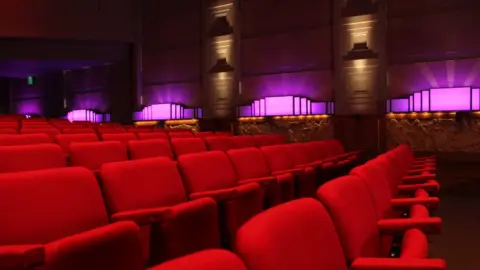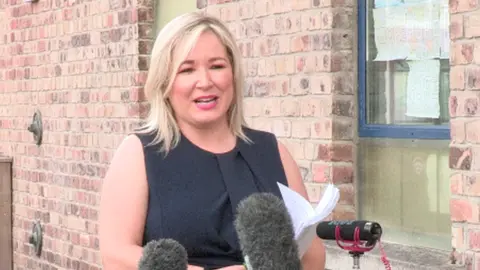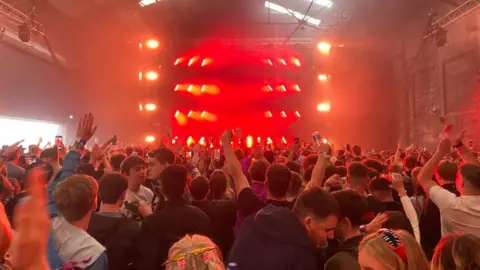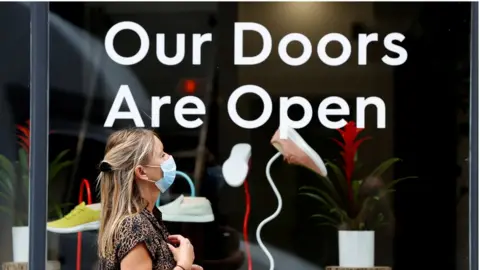Covid-19: Theatre and concert hall decision in NI delayed
 Emma Farrer
Emma FarrerA decision on whether to reopen theatres and concert halls has been delayed by the Northern Ireland Executive until next week.
Venues were expected to reopen on 26 July but minsters want more time to consider the health implications.
Ministers however have agreed to relax some restrictions considered low risk.
From Monday, 15 people from unlimited households can meet outdoors and close contact services can open without the need for pre-booked appointments.
Ministers will meet again on Monday to decide if theatres can reopen.
If given the go ahead, those measures would come into effect immediately.
In a statement on Thursday afternoon, the Northern Ireland Executive said "modest relaxations" had been agreed after careful consideration.
It followed an update from health and scientific advisers on how the virus is progressing, including the increasing numbers of cases and hospital admissions, the statement added.
It comes as another 1,430 positive cases were reported by the Department of Health on Thursday. This includes samples taken in recent days, not necessarily in the last 24 hours.
No further deaths were recorded.


The frustration here is not totally surprising.
A pause has been put on things which some people hoped would be given the green light and the most disappointed people will be those who run our theatres and concert halls.
Today's decision doesn't mean reopening of those venues won't happen, but it's not going to happen as quickly as the people who own them want.
However, when you consider some of the figures that ministers were considering today, that is not a surprise.
This all happens before the executive meets on 12 August to consider the mandatory wearing of facemasks and the end of social distancing.
It doesn't look like 'freedom day' - or anything like it - will be announced in Northern Ireland anytime soon.

Deputy First Minister Michelle O'Neill said the decision to make modest changes to restrictions was made "in the context of a rapid increase in the number of cases".
She said there had also been a doubling of the number of people in hospital in the last eight days, the majority of whom were unvaccinated.
Ms O'Neill reiterated a call for young people to take up the opportunity to get vaccinated at pop-up centres across Northern Ireland.
"A cautious approach is what is required here and a steady approach," she said.

Ms O'Neill said health officials had advised there would be more data available next week, which would help them understand the correlation between Covid-19 cases and admissions to hospital.
She said this information would help inform decisions around restrictions that may be further eased.
Dr Alan Stout, chairman of Northern Ireland's GP committee, described the Northern Ireland Executive's decision as "sensible and measured".
He said the executive had not bowed to pressure to ease restrictions but has instead based its decision on data and the risks faced.
"The temptation is that we move too soon, we need that little bit more time," he told BBC Radio Ulster's Evening Extra programme.
However, Dr Stout added that Northern Ireland was "not losing the race" between infections and vaccines.
'Regrettable'
"We are doing well and we are protecting people. We would shudder to think what position we would be in right now if we had not vaccinated as many people," he said.
However, Retail NI chief executive Glyn Roberts said it was "regrettable" more progress could not have been made in the wider reopening of the economy.
He added that the executive also needed to take action about the number of people being required to self-isolate.
"We have received numerous calls from members this week indicating that they could well have to close because of staff having to self-isolate," he said.
"At the very least, we need the executive to bring Northern Ireland into line with the English date of 16 August, which allows 'pinged' double-vaccinated workers to take a PCR test, rather than self-isolation for 10 days."
Meanwhile, Ireland's deputy chief medical officer Dr Ronan Glynn said the number of Covid-19 cases related to overseas travel had increased "very sharply".
He said 676 cases were reported in the last fortnight in people returning from Spain, Great Britain and Portugal.
Allow X content?
In a series of posts on Twitter, Dr Glynn said it was "strongly advised" that people should only travel on the basis of their vaccination status or immunity after recovering from Covid-19.

Analysis
By Louise Cullen, BBC News NI health reporter
We know younger people are currently affected more by Covid-19 because a large part of that cohort simply have not had a vaccination yet.
The uptake is slow in that age group.
Of all the positive tests in the previous seven days, more than 90% were in those aged under 60.
Anecdotally, we are hearing from some people that they are getting vaccinated but some are still catching the virus.
A lot of people have said to us that they really would not like to see what they would have had to go through if they had not been vaccinated.
It is a complicated, hard-hitting and unpleasant virus.
Our hospital figures are remaining reasonably low but today we have 162 people in hospital.
There is a lag, however. In another two to three weeks, we are going to see those rising case numbers reflected in hospital admissions.

Indoor gatherings
The Northern Ireland Executive will also decide on Monday if the current limit on indoor gatherings can be increased from six to ten people, from no more than three households.
A decision on the reopening of MoT test centres is also due to be taken at that meeting.
Other decisions, including removing the restrictions on sound levels from indoor venues, the holding of conferences and exhibitions and reducing social distancing to one metre will be considered next Thursday.
Many Covid restrictions in Northern Ireland have been lifted in recent months, after a lockdown that lasted about four months.

However, theatres and live music venues have been closed in Northern Ireland for the best part of 16 months, with all other parts of the UK already allowing them to reopen.
The arts and music sector had been urging the executive to stick to the latest indicative date and allow the industry to resume trading, with mitigations.
What had ministers been considering?
They had been looking at allowing a range of relaxations including:
- 10 people from three households to meet indoors at home - children aged 12 and under are exempt from the limit
- 15 people from an unlimited number of households to meet in a private garden
- Theatres and concert halls to reopen, with social distancing of 1m (3ft) required
- Removing the restrictions on sound levels of music at indoor venues
- Conferences and exhibitions to resume
- Hair and beauty salons to operate without requirements for appointments and overlapping appointments to be permitted
- Social distancing legal requirement to be reduced to 1m indoors, and removed for all outdoor activities
- MoT centres to resume normal services, allowing customers to be present in testing halls
The executive previously said that it intended to remove the so-called "bubble" caring provision if it approved the relaxations for increasing numbers of people allowed to meet at home.
 Reuters
ReutersWhat about face coverings?
Although mandatory use of face coverings in England ended on 19 July, that does not apply in Northern Ireland.
Ministers have discussed the issue in recent days but they are moving more cautiously with lifting that rule.
They did put in place an indicative date of 26 July, which would see face coverings no longer compulsory in places of worship or for students in school classrooms in the new term - but that has yet to be signed off by ministers.
Ministers are due to review the wearing face coverings in places of worship at next Thursday's executive meeting.
Looking at ending the mandatory use of face coverings more widely is unlikely to be discussed by ministers until a meeting on 12 August.
Masks have been legally required in Northern Ireland on public transport, in shops and in a range of other settings since last summer, with a limited number of exemptions.
When might Covid restrictions end in Northern Ireland?
That is not entirely clear.
Decisions on easing or imposing restrictions must be agreed by the five parties in the executive.
They have to consider advice from health officials about the spread of the variant, as well as social and economic effects of restrictions on the public.
The first and deputy first ministers have indicated that they will meet again on 12 August to look at lifting requirements for face coverings in other settings, the requirement for self-isolation and travel.
